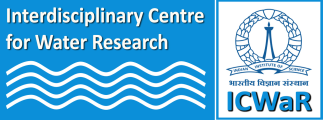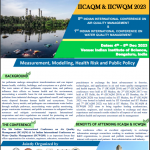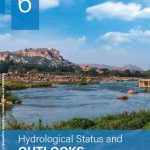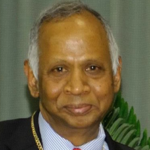Are Cities Culprits or Victims? India’s Carbon Footprint Beyond 2020
Name of the Speaker: Prof. Kala Seetharam Sridhar
Title of the Seminar: Are Cities Culprits or Victims? India’s Carbon Footprint Beyond 2020
Date and Time: 27 Dec 2021 (Monday), 4:00pm
Online Platform: MS Teams [link to the video of the seminar]
About the Speaker: Kala S Sridhar, Ph D is Professor, Centre for Research in Urban Affairs at the Institute for Social and Economic Change (ISEC), prior to which she was Ford Public Affairs Fellow at Public Affairs Centre, Fellow at the National Institute of Public Finance and Policy and taught at the Indian Institute of Management Lucknow as Assistant and Associate Professor. She has authored or edited several books published by Routledge, Oxford University Press, Palgrave Macmillan, Springer, and Sage, and has published papers in journals which include Regional Science and Urban Economics, Urban Studies, Applied Economics, among others. She is a Fulbright Nehru fellow during 2021-22, hosted by the University of California Los Angeles. She has a Ph.D. from the Ohio State University and M.S. from the University of Iowa. She is a regular contributor of columns to India’s financial dailies such as Economic Times. She has won several international awards for her research on urbanization including the highly competitive Global Development Network medal for outstanding research on development, two times. She was empanelled to be Indian Council for Cultural Relations (ICCR), Chair Professor of Indian Studies (Economics) in Foreign Universities 2015. She is consistently among the top 10% of authors globally on the Social Science Research Network. She has been a member of expert committees on urban development for the Government of Karnataka, and has done extensive research for the Asian Development Bank (ADB). She was member of the Scientific Committee of the 2016 Urban Transitions Conference, co-hosted by Yale University and Elsevier, which was held in Shanghai, People’s Republic of China. She is a referee for many international journals including Urban Studies, Cities, Housing Policy Debate, Environment and Urbanization Asia, among several others. She is on the editorial advisory board of journals such as Area Development and Policy (Taylor Francis), Urban India (published by India’s National Institute of Urban Affairs), and Frontiers in Built Environment Urban Science.
Abstract: While the Global North and South were very different in terms of their trajectory of economic growth some years ago, now they are increasingly convergent on economic growth as well as their environmental sustainability. It is now also well known that cities are the engines of economic growth in developing countries of the Global South. However, much as they are the engines of the economy, cities are also blamed for carbon emissions due to a number of factors. But cities are also victims of carbon emissions and climate change due to the density of population and economic activity.
Carbon emissions are determined not only by urbanization, but also by a city’s spatial area, its income, energy consumption, and value added by industry. In this research we understand the role played by various factors on carbon emissions empirically by examining India’s data at the district level, where city level data on carbon emissions are quite rare. We use a unique dataset of carbon footprint at the district level, adapting from Lee et al (2021). We estimate carbon emissions as dependent on the district area, urbanization, per capita income, literacy rate, workforce participation and population density. We find rising literacy rate, urbanization, labor force participation, poverty ratio and income to be major causes of rising carbon footprint. We find geographic area of a district has no effect on carbon footprint. Given that reducing poverty ratio is a factor in increasing carbon footprint, the question to ask is if this is equitable. The regression is used to predict carbon emissions in the medium term, i.e., 2030, and longer run, i.e., 2050, assuming current trends continue.
Reference
Lee, Jemyung, Oliver Taherzadeh, and Keiichiro Kanemoto. “The scale and drivers of carbon footprints in households, cities and regions across India.” Global Environmental Change 66 (2021): 102205.
Date/Time
Date(s) - 27/12/2021
4:00 pm - 6:00 pm















